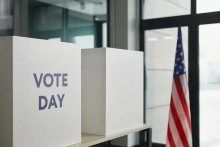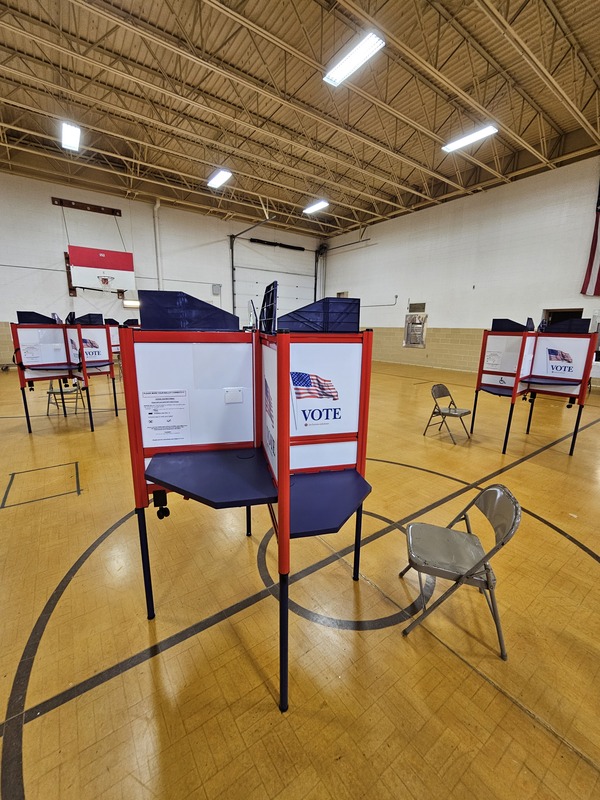
Early voting has already begun in Indiana in advance of the Nov. 5, general election. (Photo/Pexels.com)
Three days after early voting began in the state and less than a month before the Nov. 5 general election, Indiana Secretary of State Diego Morales and Indiana Attorney General Todd Rokita asked federal officials to verify the citizenship status of more than 550,000 Hoosiers on the state’s voting rolls.
Their effort prompted a warning from a coalition of voting advocacy groups saying it could lead to voter intimidation and widespread disenfranchisement and possibly be met with a lawsuit for a violation of federal election law.
Morales and Rokita sent a letter, dated Oct. 11, to U.S. Citizenship and Immigration Services, seeking to confirm that every individual on Indiana’s voter rolls is a U.S. citizen in order to, they said, prevent voter fraud and maintain the integrity of the elections. registered to vote in Indiana is a U.S. citizen. Their letter included three lists – not released to the public – of registered who either did not provide a driver’s license number or Social Security number or are located overseas.
“As Indiana’s Chief Election Officer, I am committed to ensuring that every registered voter in Indiana has met the legal requirements, including being a U.S. citizen,” Morales said in a statement that accompanied the release of the letter to the public.
Morales said that the inquiry to USCIS “will not result in an effort to remove registrations from the voter registration list.” Also, since their registration status will not change, he said, the 585,774 individuals are not being notified that their citizenship is being questioned.
However, local election officials will be notified if any noncitizens are identified on the voter rolls, Morales said. These officials, he said, investigate further or challenge those voters when they cast their ballots.
Voters challenged at the polling place would have to vote with a provisional ballot. Then they would have to provide additional voter identification documents to local election officials within 10 days of the election in order to have their vote counted.
Describing the USCIS letter as taking a “proactive step,” Morales said he is partnering with the attorney general to gather the missing information for individuals who registered without a state-issued ID.
“This is crucial to maintaining the integrity of our elections and increasing public confidence,” Morales added. “Only U.S. citizens can vote in Indiana. Period.”
Indiana Secretary of State Diego Morales (Photo/submitted)
Warning Against Removing Voters From Rolls
A coalition of state and national nonpartisan organizations and voting rights advocates responded by warning Morales and Rokita against violating federal law and intimidating voters . The group sent an advocacy letter on Oct. 18 and asserted the National Voter Registration Act prohibits the secretary of state and the attorney general from removing, or authorizing the removal of, names from the Indiana voter rolls fewer than 90 days before the Nov. 5.
The coalition includes the Chicago Lawyers’ Committee for Civil Rights, the national Lawyers’ Committee for Civil Rights Under Law, Common Cause Indiana, Count USA Indiana, the League of Women Voters of Indiana, Indianapolis attorney William R. Groth and other interested parties.
With the general election less than three weeks away, the coalition wrote in the letter to Morales and Rokita that any attempt to purge the voter rolls or give the information from USCIS or another source to local election officials so they can “systemically challenge voters,” could bring legal action.
“We are unaware of any information indicating that non-citizens are attempting to vote in this forthcoming election conducted by Indiana,” the coalition wrote. “Moreover, there is no basis for concluding that the registered voters included in the broad groups you identified in your letter … are situated such that there is any cognizable reason to suspect that any are in fact non-citizens.”
Also, Stand Up Indiana, a voter advocacy organization focused on bringing political balance to the state legislature, called this move by Morales and Rokita “a blatant attempt to suppress voters.” The organization asserted thousands of legitimate voters, particularly from marginalized communities, could be “unfairly blocked from voting” by “baseless claims of voter fraud.”
Stand Up is circulating a petition and asking people to sign to “show that Hoosiers will not sit on the sidelines and watch our rights be taken away.”
Although statistics and studies show voting by noncitizens is extremely rare across the United States, the baseless claim that former President Donald Trump made after the 2016 election continues to spread. Trump won the Electoral College in that election with 306 votes to Hillary Clinton’s 232 votes, but he falsely accused “millions of people” of voting illegally and causing him to lose the popular vote by nearly 3 million votes.
The Brennan Center for Justice, questioning whether Trump’s claims were plausible, did an analysis of the 2016 presidential election. Pulling data from 42 jurisdictions in 12 states – including eight of the 10 jurisdictions with the largest populations of noncitizens – the center found only about 30 cases of possible noncitizen voting.
Georgia Secretary of State Brad Raffensperger audited the state’s voter rolls in search of noncitizens in 2022. The result showed that less than 1,700 cases of potential noncitizens registering to vote, with none casting a ballot in the past 25 years. Raffensperger said in 2024, “Noncitizens are not voting in Georgia.”
Risk Of Committing A Crime, Losing Benefits
In a statement to the media, Morales said his office submitted the 585,774 names to the USCIS “out of an abundance of caution.” He said only “a small number of non-U.S. citizens” are believed to have registered to vote in the November election, but, he explained, he was “responding to concerns from county clerks regarding the increase in absentee ballots from overseas voters.”
The secretary of state’s office did not release the list to the public and did not respond to a request from The Indiana Citizen for the list.
Rachel Van Tyle, director of legal services for Exodus Refugee, an Indianapolis-based nonprofit that helps refugees resettle in Indiana, said falsely claiming to be a U.S. citizen and registering to vote is known colloquially as the “immigration death penalty.” Noncitizen Immigrants who try to register and vote are committing a federal crime and will lose all their immigration benefits.
“(Immigrants) understand how grievous it is to do this,” Van Tyle said of voting without citizenship status, “and I don’t think it happens nearly as often as this letter (to USCIS) would make it seem like it does.”
The letter from Morales and Rokita presses USCIS director Ur M. Jaddou to “fulfill its obligations” and verify the citizenship of the half-a-million-plus names in their list. Pointing to federal law and regulations, they assert the USCIS is required to respond and cannot restrict any government official or entity from receiving information about citizenship or immigration status.
While Morales said publicly that none of the 585,774 registrations would be removed from the voter rolls, he and Rokita indicated to Jaddou that is their intention.
“Information provided by USCIS in response to this inquiry can then be used by Indiana state and local officials to remove ineligible voters from our voter rolls,” Morales and Rokita said in the letter.
The coalition of non-partisan organizations and voter advocates hit back, noting the secretary of state and attorney general offices have had almost two years since the last general election to review the citizenship status of Indiana voters and clean the voter rolls. They assert that waiting so close to the election to question the eligibility of voters “suggests, at best, poor planning, and, at worst, an intent to intimidate eligible voters and to decrease public confidence in the integrity of Indiana’s elections.”
During the 2020 presidential election, 61% of Hoosier voters cast a ballot, up from 58.3% who voted in the 2016 presidential election. (Photo/file)
Doubts That USCIS Can Handle Request
In their letter, Morales and Rokita said USCIS has the capability to comply with their request. They said they provided the name and date of birth for all the individuals on the list, which is sufficient information for USCIS to verify everyone’s citizenship status by using the agency’s Person Centric Query Service.
“Hoosiers deserve to know that only eligible voters are participating in our elections and that legitimate ballots are not being diluted by noncitizens,” Rokita said in a press release. “We are doing our part to provide this assurance.”
Van Tyle, of Exodus Refugee, questioned whether the USCIS could verify Indiana’s list before Election Day. She said the agency would have the most up-to-date information about citizenship status, but she is not sure it has capability to quickly check batches of names as opposed to pulling up each individual case.
To prepare for voters potentially being challenged at the voting booth, Van Tyle advocated for educating people about provisional ballots. “I think we need to encourage voters to ask for provisional ballots, she said, noting if the individuals are found to be eligible after the election, their votes will then be counted.
The coalition said Morales and Rokita were incorrect in their assessment of what USCIS’s Person Centric Query Service could do. Pointing to a recent letter the federal agency sent to the Kansas secretary of state, the coalition said USCIS explained that system cannot accurately verify the citizenship status of thousands of individuals.
“To be clear, there is no way for (the) United States Department of Homeland Security to fulfill your request, even if it were warranted – which it is not – and even if any list maintenance program based on it were consistent with the NVRA – which it is not,” the coalition asserted.
By Marilyn Odendahl
The Indiana Citizen
October 18, 2024
Dwight Adams, a freelance editor and writer based in Indianapolis, edited this article. He is a former content editor, copy editor and digital producer at The Indianapolis Star and IndyStar.com, and worked as a planner for other newspapers, including the Louisville Courier Journal.
The Indiana Citizen is a nonpartisan, nonprofit platform dedicated to increasing the number of informed and engaged Hoosier citizens. We are operated by the Indiana Citizen Education Foundation, Inc., a 501(c)(3) public charity. For questions about the story, contact Marilyn Odendahl at marilyn.odendahl@indianacitizen.org.


